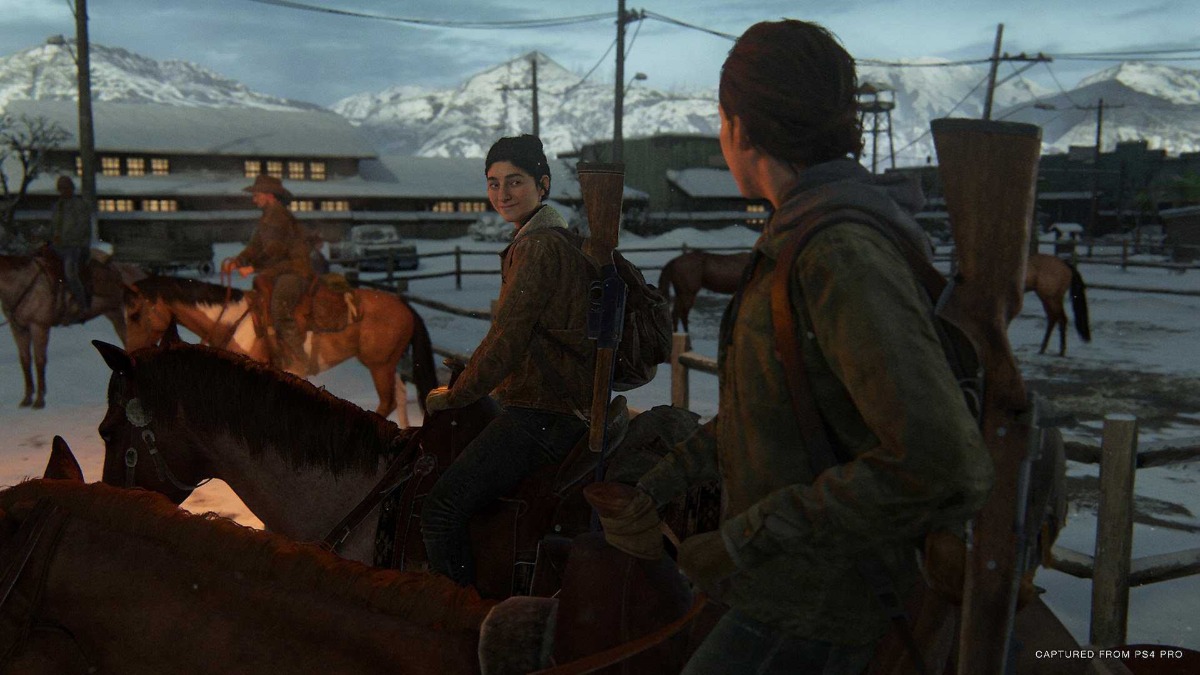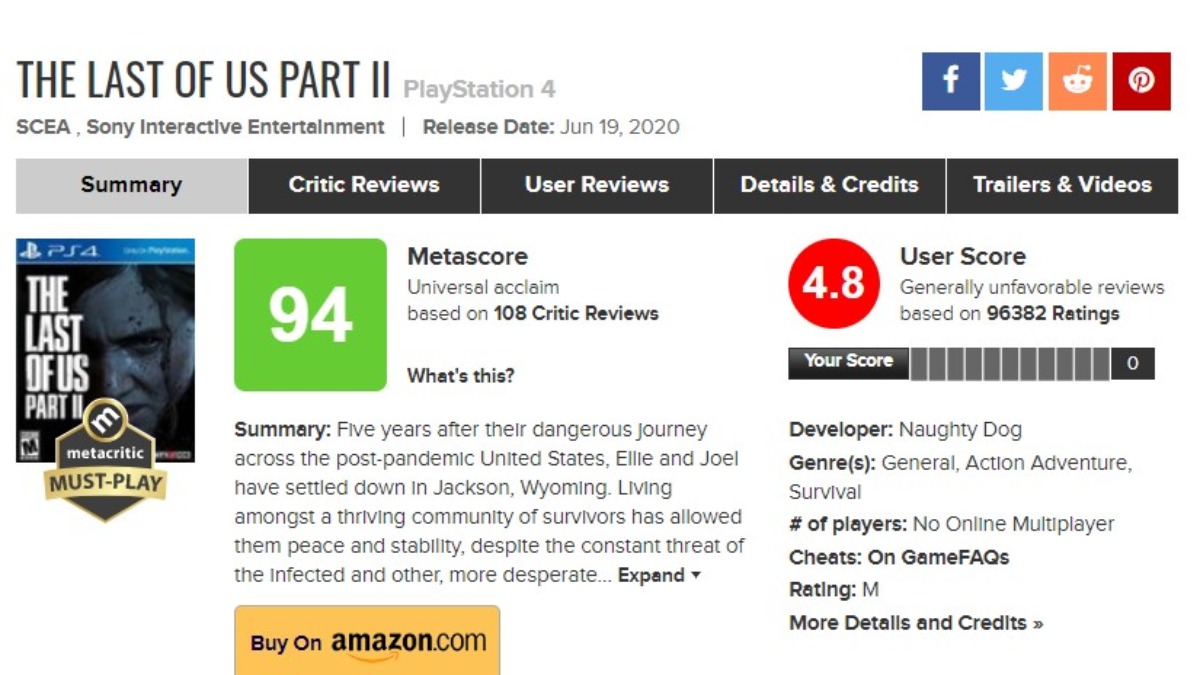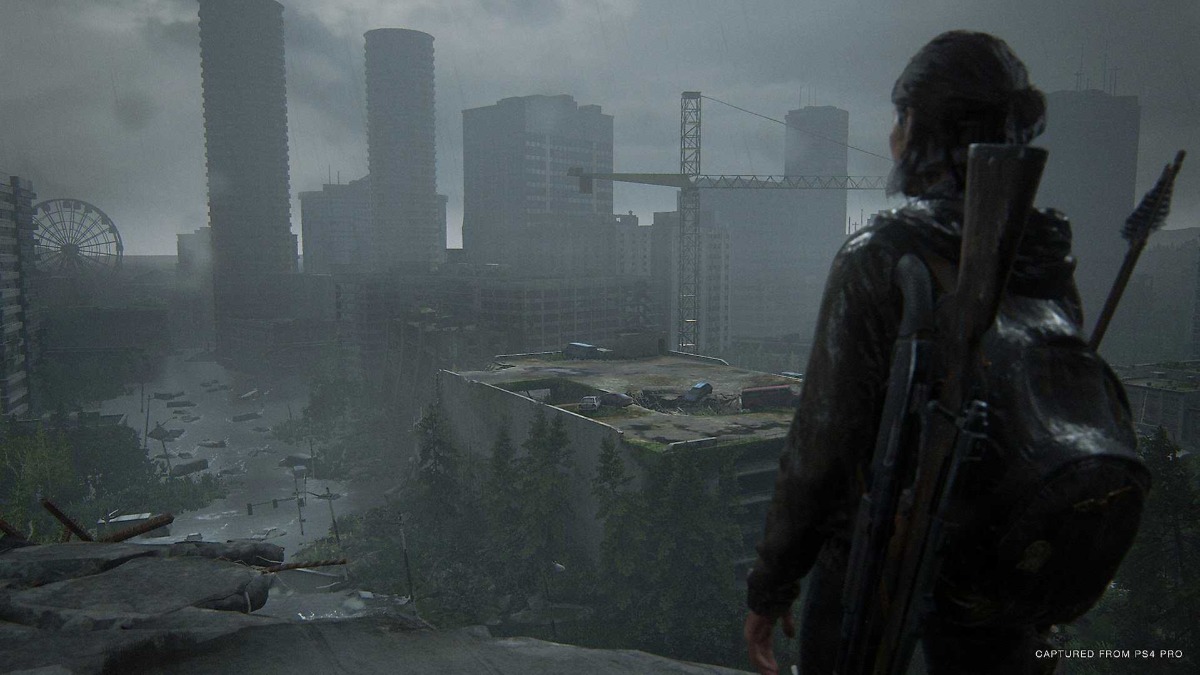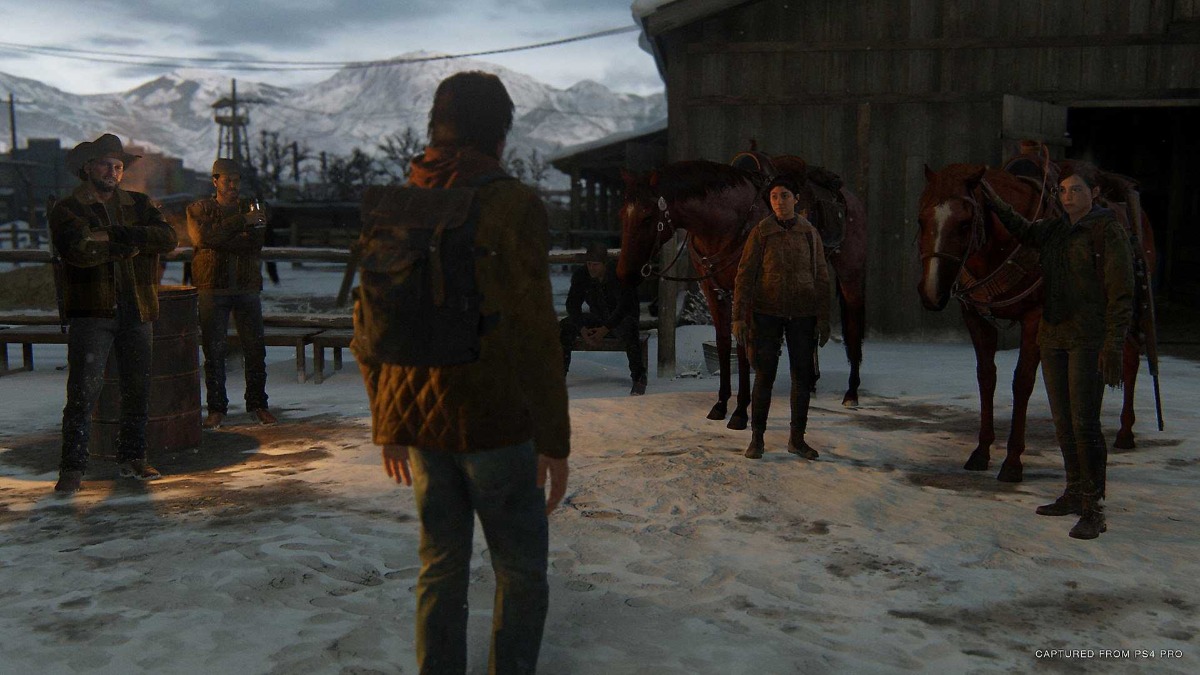Ever since reviews of “The Last of Us II” came out, the credibility of mainstream media has been put into question. From an overview, there are two main things that are wrong with the entire situation surrounding The Last of Us II reviews.
The first troublesome problem is related to “access journalism.” It basically means that certain big news outlets including Forbes, VGR, IGN, etc have access to a game before its launch. It is done so they can finish the game beforehand and stay prepared with their review. I’ll explain why it was a problem in this case, later in the article.
The second problematic thing is the absolute disconnect of the mainstream media with the general audience. The Last of Us II has a near-perfect critics score on Metacritic but its user review score is 4.8 out of 10, which classifies it as a bad game.
Now before we move on, I’ll need to discuss with you several aspects of The Last of Us series so I can clearly explain why the points mentioned above matter so much.
Warning, there are spoilers ahead.
Why Do People Love The Last of Us Series?
The Last of Us series is developed by a studio called Naughty Dog. The developer solely makes games for the Playstation gaming console. They have also made the famous uncharted series starring beloved protagonist Nathan Drake.
The Last of Us two stands out from the rest of the videogames in terms of its storytelling and cinematography. The game studio focuses on character development and story as much as it does on making a technically sound game. The Last of Us is a linear game, meaning it features no open world and the player has to move along a scripted path.
I have played The Last of Us Part 1 and it is a great game story-wise and a decent one gameplay-wise. In the first part, you play Joel, a father who lost his daughter due to an apocalypse caused by a deadly fungus. The character of Joel can shoot, punch and he can also perform stealth attacks. He cannot jump, do parkour or take on 10 guys at a single time head-on (though some skilled players can do, you get the idea).
What I am trying to say is that anyone who played The Last of Us part 1 played it for the story and the experience. The gameplay was great in terms of polish, the game has almost no bugs but it’s a bit dull in terms of variety of mechanics.
However, I still liked the game and it’s one of my best games of all time, mainly because of the story. Naughty Dog crafted a perfect story that almost anyone sitting in any corner of the world could relate to. And that’s why The Last of Us Part 1 was so successful.
Which brings us to the Last of Us Part II. The game was announced in 2017 and immediately broke the internet. To say the pressure on the Naughty Dog was high is an understatement. Not only did they have to make a game that surpassed the first one but they also had to make sure to justify its existence as well.
The Last of Us Part 1 ended on a perfect note and not many people were asking for a sequel. They were happy with the ambiguous ending of the first game.
Just like the last time, the story of The Last of Us Part II had to be perfect. It had to surpass the excellent world-building and character development of the first game while pushing the boundary of what’s possible in videogames far and beyond.
Just when everything seemed like it was going to go according to plan, the leaks came in.
The Last of Us Part II Leaks

A disgruntled employee leaked all the spoilers from The Last of Us Part II online and the reaction from the majority of the gamers was not pleasant.
People didn’t like what they saw. As it turns out, The Last of Us Part II introduced a new character named Abby who kills Joel, the protagonist of the first game, by smashing open his head with a golf club and a guy spits on his torn up corpse.
This kind of treatment for a beloved character with whom fans have spent so much of their time brought in a lot of hate.
Naughty Dog refused to comment on the validity of the spoilers and went on ahead with the game’s launch. Many fans were still convinced that the game would redeem itself in some way, that it’d justify destroying a beloved character in a satisfying way.
When the embargo on the Last of Us Part II reviews lifted, the game quickly became one of the most critically reviewed games of all time. Near perfect scores were given to the game followed by praises that might force a guy like me to open a thesaurus and a dictionary to understand them completely.
However, the main problem with almost every review was that Sony had put restrictions on certain aspects of the game. Journalists weren’t allowed to discuss some major aspects of the story. Gamers needed to know whether the story of The Last of Us Part II reaches any sort of conclusion or not in order for them to buy the game. However, Sony put a cap on that aspect from being discussed and instead allowed journalists to publish an incomplete review which at this point seemed worthless.
The Anger That Followed

As the game finally became available to download, people started playing it and uploading spoiler clips on Youtube. The rest of the players saw those clips and started “review bombing” aka posting bad reviews in large numbers of the game on Metacritic.
This led to a ton of people questioning the credibility of the mainstream media who gave the game such high praise. Clearly the player base wasn’t happy with what they saw in the game.
The online anger of fans also enraged some journalists who then went on to defend their reviews, which seemed so disconnected from the fans for whom they’re writing it in the first place.
Paul Tassi of Forbes went ahead and labeled players disliking the game as racists who hate the game’s progressive themes. He also questioned how so many people started to hate the game so quickly even though it was launched just a day ago. I think Paul probably has never heard of gaming walkthrough videos on Youtube.
Other writers from VGR took a jab at the player base to defend themselves. The writer used a different name which rhymes with “Cuck” (Google it, I don’t wish to explain) and wrote while imitating what they think the person who hates the Last of Us Part II looks like.
I personally feel that both these articles are insulting to the player base that has kept The Last of Us community alive and well across YouTube and other social media platforms. Somehow, these journalists think that their review holds value even when the player base that has been playing the game for the last 7 years disagrees with it.
Both these individuals and other journalists failed to understand the exact reason why their review was being hated and went on with the most convenient explanation they could find to maintain their now shattered credibility.
Why The Last Of Us Part II Reviews Are A Mess

A Story is a subjective thing, most of the time. People can relate to it or they cannot. Several people have also pointed out a ton of plot holes in The Story of The Last of Us Part II, which doesn’t make sense.
If a game, which relies so much on its story and ends up delivering a badly written one, it is understandable that its fans will be angry. On top of that, being called a racist upon pointing that out about your favorite game that you’ve played years on end is simply insulting.
Can a game be great without a good story? Absolutely yes! And that’s exactly what separates a video game from a movie. You can enjoy the interactive part while skipping the bits you find boring or uninteresting.
But, it’s mostly possible in an open-world or semi-open world game in which a player’s in-game actions generate stories for them to unravel. Middle Earth: Shadow of War is a great example of that. The game’s nemesis system creates randomly generated side-missions ensuring no two players experience the majority of the game in identical ways.
Whereas, in a linear story-driven game like The Last of Us Part II, the story is all you have. If you don’t like the story, you don’t like the game, it is as simple as that.
The process of “access journalism” deceived the players into thinking it was a masterpiece and the disconnect from the fans caused journalists to go into full rage mode towards their audience. I think that’s enough explanation of why mainstream media should not review videogames because any voice that disagrees with them will be labeled as something derogatory. And frankly, no one deserves that.
The post Why Mainstream Media Should Stop Reviewing Videogames appeared first on Fossbytes.
